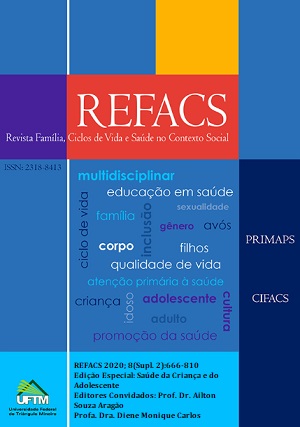Efeito do treino específico e de curta duração na aquisição e retenção do alcance manual em lactentes prematuros e baixo peso ao nascimento
DOI:
https://doi.org/10.18554/refacs.v8i0.4748Palavras-chave:
Lactente, Recém-nascido prematuro, Intervenção precoce.Resumo
Este é um estudo de caráter descritivo, longitudinal, com amostra por conveniência de natureza aplicada, desenvolvido de fevereiro a dezembro de 2018, com o objetivo de verificar se o treino específico, condição de prática variada seriada, de curta duração, influencia o comportamento de alcance manual e a retenção da habilidade em lactentes pré-termo com baixo peso ao nascimento. Participaram seis lactentes de ambos os sexos, aleatoriamente divididos em: grupo experimental que recebeu treino específico, e grupo controle que recebeu apenas interação social. Foram analisados 180 alcances de ambos os grupos. Embora sem diferença estatisticamente significativa, mas com relevância clínica, os resultados demonstraram que o treino específico promoveu melhora na frequência total do alcance (d=0,88, 95% IC), e, nos ajustes distais do alcance (mão oblíqua e semiaberta), no grupo experimental em relação ao grupo controle. Nos parâmetros cinemáticos do alcance, os resultados mostraram um alcance mais organizado, indicando que algo foi aprendido e/ou mudado no período imediato ao treino, contudo, não foi verificada a retenção da aprendizagem. Assim, acredita-se ser necessário um treino mais prolongado para se obter a retenção da aprendizagem.
Referências
Guimarães EL, Cunha AB, Soares DA, Tudella, E. Reaching behavior in preterm infants during the first year of life: a systematic review. Motor Control. [Internet] 2013 [citado em 06 jul 2018]; 17:340-54. DOI: https://doi.org/10.1123/mcj.17.4.340
Nascimento AL, Tedesco NM, Soares-Marangoni DA. Evidence of training influence on infant manual behavior: a systematic review. J Hum Growth Dev. [Internet] 2019 [citado em 17 abr 2020]; 29(2):216-31. DOI: http://doi.org/10.7322/jhgd.v29.9425
Guimarães EL, Tudella E. Immediate effect of training at the onset of reaching in preterm infants: randomized clinical trial. J Motor Behav. [Internet]. 2015 [citado em 20 dez 2018]; 47(6):535-49. DOI: https//doi.org/10.1080/00222895.2015.1022247
Soares DA, Cunha AB, Tudella E. Differences between late preterm and full-term infants: comparing effects of a short bout of practice on early reaching behavior. Res Dev Disabil. [Internet]. 2014 [citado em 20 set 2018]; 35(11):3096-107. DOI: https://doi.org/10.1016/j.ridd.2014.07.041
Heathcock JC, Lobo M, Galloway JC. Movement training advances the emergence of reaching in infants born at less than 33 weeks of gestational age: a randomized clinical trial. Phys Ther. [Internet]. 2008 [citado em 30 out 2018]; 88(3):310-22. DOI: https//doi.org/10.2522/ptj.20070145
Nascimento AL, Toledo AM, Merey LF, Tudella E, Soares-Marangoni DA. Brief reaching training with “sticky mittens” in preterm infants: randomized controlled trial. Hum Mov Sci. [Internet] 2018 [citado em 17 abr 2020]; 63:138-47. DOI: https//doi.org/10.1016/j.humov.2018.11.015
Soares DA, Van Der Kamp J, Savelsbergh GJ, Tudella E. The effect of a short bout of practice on reaching behavior in late preterm infants at the onset of reaching: a randomized controlled trial. Res Dev Disabil. [Internet]. 2013 [citado em 13 nov 2018]; 34:4546-58. DOI: https//doi.org/ 10.1016/j.ridd.2013.09.028
Cunha AB, Woollacott M, Tudella E. Influence of specific training on spatio-temporal parameters at the onset of goal-directed reaching in infants: a controlled trial. Rev Bras Fisiot. [Internet]. 2013 [citado em 15 dez 2018]; 7(4):409-17. DOI: https://doi.org/10.1590/S1413-35552013005000099
Williams JL, Corbetta D, Guan Y. Learning to reach with “sticky” or “non-sticky” mittens: a tale of developmental trajectories. Infant Behav Dev. [Internet] 2015 [citado em 30 dez 2018]; 41:82-96. DOI: https//doi.org/10.1016/j.infbeh.2015.01.001
Cunha AB, Lobo MA, Kokkoni E, Galloway JC, Tudella E. Effect of short-term training on reaching behavior in infants: a randomized controlled clinical trial. J Mot Behav. [Internet] 2016 [citado em 08 jan 2019]; 48(2):132-42. DOI: https//doi.org/ 10.1080/00222895.2015.1050549
Wiesen SE, Watkins RM, Needham AW. Active motor training has long-term effects on infants' object exploration. Front Psychol. [Internet] 2016 [citado em 01 fev 2019]; 7:599. DOI: https//doi.org/10.3389/fpsyg.2016.00599
Needham AW, Wiesen SE, Hejazi JN, Libertus K, Christopher C. Characteristics of brief sticky mittens training that lead to increases in object exploration. J Exp Child Psychol. [Internet] 2017 [citado em 24 mar 2019]; 164:209-24. DOI: https//doi.org/ 10.1016/j.jecp.2017.04.009
Piper MC, Darrah J. Motor assessment of the developing infant. Philadelphia, Pennsylvania: W. B. Saunders Company; 1994.
Guimarães EL, Barreiro MS, Lage JB, Araujo LA, Tudella E. Arranjo experimental para análise cinemática do alcance manual em lactentes. Movimenta [Internet]. 2015 [citado em 26 jun 2020]; 8(1):15-22. Disponível em: https://www.revista.ueg.br/index.php/movimenta/article/view/3354
Cunha AB, Soares DA, Ferro AM, Tudella E. Effect of training at different body positions on proximal and distal reaching adjustments at the onset of goal-directed reaching: a controlled clinical trial. Motor Control [Internet]. 2013 [citado em 03 maio 2019]; 17(2):123-44. DOI: https//doi.org/10.1123/mcj.17.2.123
Guimarães EL, Cunha AB, Mira DM, Tudella E. Influence of short-term training on the distal adjustments of reaching in preterm infants. J Hum Growth Dev. [Internet]. 2015 [citado em 06 maio 2019]; 25(3):263-70. DOI: https://dx.doi.org/10.7322/jhgd.89621
Toledo, AM, Soares-Marangoni, DA, Fonseca, MV, Tudella, E. Introdução ao alcance manual. In: Tudella E, Toledo, AM, Lima-Alvarez, CD, organizadoras. Intervenção precoce: evidências para a prática clínica em lactentes de risco. Curitiba: Appris; 2019. p. 155-70.
Downloads
Publicado
Edição
Seção
Licença
Este trabalho está licenciado sob uma licença Creative Commons Attribution-NonCommercial 4.0 International License.



